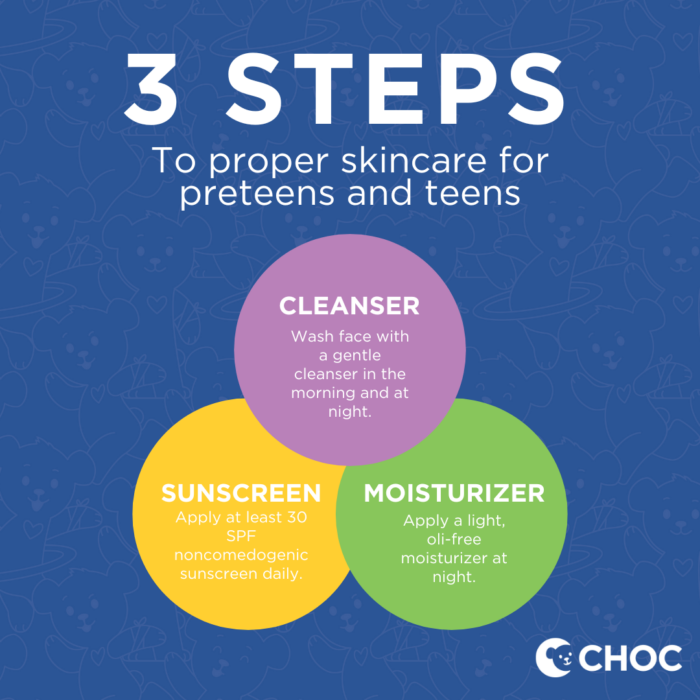Do preteens and teens need to use fancy skin care products? Get answers from a pediatric dermatologist
By Dr. Brandie Metz, pediatric dermatologist at CHOC
As a pediatric dermatologist, I have seen an increasing number of kids — some as young as 8 years old — who come to my office asking for advice about skincare, toting bags of fancy, expensive products. There has been a recent trend amongst teens and tweens to be drawn to purchase high-end skin care products from beauty stores.
You may be asking yourself: How did we get here?
Why are fancy skincare products so trendy for preteens and teens?
Young people are increasingly exposed to beauty and skincare trends through social media, where they are inundated with videos by influencers who share their beauty routines and are paid to promote products.
In addition, the fun, colorful packaging makes these products seem “cooler” than common skin care brands carried in drug stores.
“I would like to think that there is a positive side to this trend … young people are taking care of their skin earlier and are more willing to adhere to a skincare routine,” says Dr. Metz. “I see this interest in beauty and skincare as a great opportunity to educate younger generations about their skin, and to encourage them to build healthy habits — especially sun protection.”
At what age should kids start a skincare routine?
Daily cleansing of the face becomes important in the pre-puberty years when kids become prone to clogging of the pores and breakouts. This most commonly begins to occur between the ages of 8 to 10 years.
No age is too young to implement daily sunscreen, a practice that can prevent cumulative damage from regular UV exposure and ultimately decrease the risk of developing skin cancer. But it doesn’t hurt that this excellent habit can also prevent aging and keep skin glowing.
Skin care routines for preteens

 Print this for your preteens and teens
Print this for your preteens and teens
Young people starting a skincare regimen don’t need pricey products or overly complicated routines:
- In the morning, preteens and teens should wash their faces with a gentle cleanser.
- Then, they should apply a noncomedogenic (which means it won’t clog pores) sunscreen with an SPF of at least 30.
- In the evening, they can use that same gentle cleanser and apply a light, oil-free moisturizer.
Can using too many skincare products be harmful to a preteen’s skin?
It is important for parents to know that piling on too many active ingredients might do more harm than good for young skin. Ingredients like retinol and exfoliating acids can over dry the skin and damage the skin barrier, causing skin irritation, breakouts and even long-term damage.
Skin concerns are different at different ages, and using the wrong products can result in rashes, allergic reactions, or worsening of acne. For example, retinoids can be used for both acne and anti-aging, but anti-aging products contain additional ingredients such as oils which can clog pores and exacerbate acne.
What is not appropriate for a preteen’s skin? Any products or ingredients to avoid?
Preteens and teens should avoid products containing:
- Retinol.
- Vitamin C.
- Alpha- and beta- hydroxy acids.
- Peptides.
Additionally, Preteens should avoid products labeled with words like: anti-aging, wrinkle-reducing, brightening and firming, all of which may be signs of active ingredients not meant for young kids.
How can parents guide their kids to practice a safe, healthy and easy skincare routine?
Parents can encourage their kids to stick with a simple skincare routine consisting of a gentle cleanser, moisturizer and sunscreen. The importance of sunscreen and sun protection should be emphasized, both as part of a daily skincare routine and for swimming or sports.
Parents should make sure that their children have products which are age-appropriate.
Lastly, if they have specific skin concerns such as acne or eczema, it may be best to consult a dermatologist.
For more health and wellness resources from the pediatric experts at CHOC, sign up for the Kids Health newsletter.
Find a CHOC Primary Care Pediatrician
From babies to teens, pediatricians from CHOC’s Primary Care Network partner with parents to offer immunizations, sick visits, sports physicals and more.





